


FRIENDSHIP | ACTION | ADVENTURE June 2022 ALSO IN THIS ISSUE: What the finance expert wishes you knew about gaming The briefing Adventurer Monty Halls reveals what he's learnt
WHAT'S IT LIKE BEING A SPACE ENGINEER? MEET THE CADETS TRAINING TEAM PLANT POWER FOR HEALTH LIFE-CHANGING ADVENTUROUS TRAINING
Photo: Matt Austin













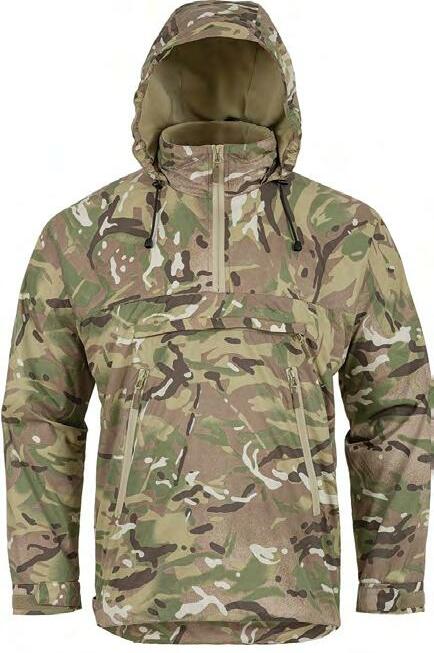
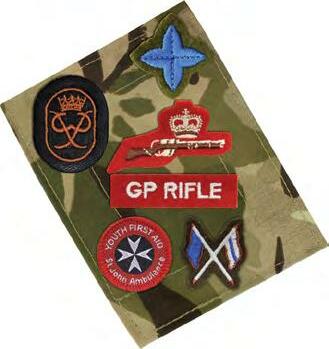





p Payments secured by Highlander Eagle 2, 30L, HMTC T T193-HC £49.99 ACF/CCF MTP Cadet Rank Slides AA03RMC £5.25 ACF Adult CFAV TRF CFAV/ACF £1.49 Proficiency Badges FROM £0.89 V I S I T W W W. C A D E T D I R E C T. C O M TO S E E F O R O U R F U L L R A N G E Unit 4, Sybron Way, Crowborough, East Sussex TN6 3DZ E-mail: orders@cadetdirect.com • Telephone: 01892 662 230 Contains images licensed under the Open Government Licence v3 0 Highlander Thermal Halo Smock, MTP JAC076-HC £55.95 Drysure Ultimate Boot Dryer DU-BLK-RG-20 £29.95 Pentland Combat Boot, MoD Brown FOT146-BN £79.95 Highlander Eagle 3 40L, HMTC T T194-HC £69.99 NEW CATALOGUE ORDER A COPY ONLINE FREE T H E U K ’ S L E A D I N G S U P P L I E R O F C A D E T U N I F O R M S & E Q U I P M E N T
Have you downloaded the Cadet Portal app?

It's easy to do. Just log into the Cadet Portal and click 'install app' in the top right corner. This will add the Cadet Portal as an application on your device and give you easy access to it. Use it to track your progress through the Army Cadets syllabus, search for courses and training events, and access your personal logbook. You can even design your own cadet avatar.
Welcome
June is here and with it comes the promise of warmer weather, outdoor adventures and, of course, summer camps.
In this issue we put the questions to some fascinating people to gain insights into their success. We quiz TV adventurer Monty Halls on the qualities needed to be a great leader, get tips from Inmarsat’s Edwina Paisley on how to break into the world of space engineering, and discover why taking part in AT has been life changing for former cadet Crystal Drane.
We also get GP Gemma Newman's prescription for a healthy life and discover what financial expert Annette Whalley wishes we all knew about online gaming. Plus, you'll find inspiring news stories from across the detachments.
I hope you all have a fantastic summer and I look forward to meeting as many of you as I can!
Neville Holmes MBE Deputy Commander Cadets

www.saltmedia.co.uk
 Brigadier
Brigadier
Copyright The contents of this magazine are fully protected by copyright and may not be reproduced without permission. Disclaimer While every effort has been made to ensure that adverts, details and articles appear correctly,
Army Cadet Magazine cannot accept responsibility for any loss or damage caused directly or indirectly by the contents of this publication. The views expressed in this publication are not necessarily those of its publisher or editor.
Army Cadet Magazine is produced by
Photo: Kate Knight
pq

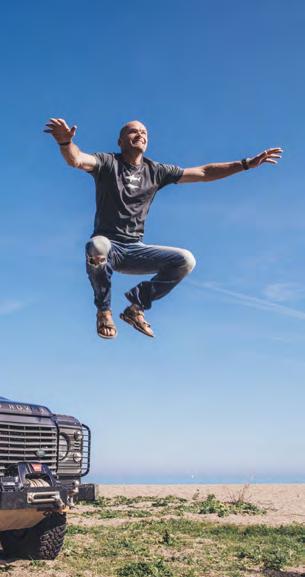



4 5 The briefing News from across the detachments. 12 What I've learnt about leadership Adventurer Monty Halls tells all. 16 What's it really like being ... a space engineer? 20 Life-changing adventures Former cadet Crystal Drane on the power of AT. 22 Plant power! GP Gemma Newman shares her prescription for a healthy and happy life. 26 What the financial expert wishes you knew ... about online gaming. 28 Meet the training team Put faces to the names you know so well. 10 12 20 Contents 16 22
The briefing
News from across the detachments
Cadet Cambrian Patrol success
Formidable navigation skills, resilience and endurance were in evidence in April when cadets from England, Scotland and Wales took part in the Cadet Cambrian Patrol. The gruelling 36-hour exercise across Sennybridge Training Area in Wales has a reputation for being the most demanding and strenuous event in the Cadets calendar.

Patrols were tasked with navigating 30km cross country over 48 hours, while being tested on fieldcraft, tactics, shooting, first aid, observation, and command and control skills. This was carried out without CFAV supervision: patrols' movements were monitored via satellite trackers. On completion, they were awarded either a certificate or a bronze, silver or gold medal.
CTT Wales Training Officer Captain Brian Baldwin, who planned and delivered the exercise, said: ‘The aim of the Cadet Cambrian Patrol is to provide a challenging patrol exercise to enhance team cohesion. Stands and tasks are intended to test all eight team members within the section. By completing the exercise we hope our cadets are inspired to strive for exceptional achievements.’
Despite limited opportunities for build-up training (due to the pandemic), 120 cadets took part. They were supported by 50 staff from the Army and Army Reserve, and CFAVs. The event, which aims to replicate the Army’s Exercise Cambrian Patrol, was hosted by CTT Wales and HQ 160th (Welsh) Brigade.
Best Welsh Patrol Clwyd and Gwynedd ACF
Best International Patrol Tunbridge Wells Girls’ Grammar School CCF
Best ACF Section Commander Cadet Colour Sergeant Ferguson, Hampshire and Isle of Wight ACF
Best CCF Section Commander Cadet Regimental Sergeant Major Dembinski, Dulwich College CCF
Gold medals Dulwich College CCF, Tunbridge Wells Girls’ Grammar School CCF
Silver medals Dollar Academy CCF, Hampshire and Isle of Wight ACF, King Edward’s School Bath CCF, Maidstone Grammar School CCF, Royal Grammar School High Wycombe CCF
Bronze medals Barnard Castle School CCF, Durham ACF, Clwyd and Gwynedd ACF, Gwent and Powys ACF (1), Gwent and Powys ACF (2), Monmouth CCF, St Brigid's School CCF
Certificate Llanwern CCF

5
THE BRIEFING
The briefing
News from across the detachments
Jordan Wylie visits military skills competition
Army Cadets National Ambassador Jordan Wylie had words of encouragement for cadets from HQ West Midlands CTT who took part in a military skills competition in April.

The award-winning adventurer spoke to the cadets during the two-day competition at Swynnerton Training Camp in Staffordshire. The competition centred on military exercises that included first aid, navigation, antiambush, CIS, gun run and casualty evacuation under contact. There was also a military knowledge assessment, an orienteering course and a Scorpion Air Rifle shoot.
The CCF winner was King's School Worcester CCF, and the ACF winner was Inkerman Coy, Shropshire ACF.
Summer camps
Summer camps return this month with plenty of exciting activities on offer.

‘Camps will vary, but you should expect a range of fieldcraft and shooting elements, signals training and some adventurous and teamworking activities, as well as the old favourite, drill,’ said Major Simon Mann. ‘Some camps will take advantage of operating in the built environment by using skills houses, as well as a range of obstacle courses and other physical activities.
'After the last two years we are all looking forward to the summer 2022 Army Cadet annual camp period, returning to something like the pre-Covid camps. As always, we thank our CFAVs who make these camps happen and their enthusiasm for ensuring all our cadets have a fun and active camp, with an eye on progressing skills and behaviours in a safe environment.’
CCF camps start in June; ACF camps start with 51 and 38 Brigades in July.
6
Photo: Kate Knight
Master Cadet Course

Top cadets from across the country took part in the Master Cadet Course in April. The course is the pinnacle of a cadet’s career and is open to 4-star cadets aged 16 and over. Its aim is to broaden and develop leadership, instructional and administrative responsibilities. There were 32 cadets on the course, which culminated in a dinner at CTC Frimley Park attended by General David Eastman MBE and Brigadier Neville Holmes MBE.
Find out about the Master Cadet Course here or scan the QR code.



Service of Thanksgiving
A Service of Thanksgiving for the life of His Royal Highness The Duke of Edinburgh was held at Westminster Abbey in March.
Alongside the Royal Family and Prince Philip’s friends were representatives from The Duke of Edinburgh’s patronages and charities, including members of Army Cadets (pictured above). The Duke of Edinburgh was Colonel-in-Chief of Army Cadets from 1953 until his death in April 2021.
Rolling Thunder
Sussex ACF were hailed champions for the third year running at Ex Rolling Thunder, the national signals competition which took place at Blandford, Dorset, in March.


‘Having been a Signaller since 2018 and worked up to my current role of platoon sergeant, I was extremely excited to take my team to this competition,’ said Cadet Sergeant Amelia Lawton of Sussex ACF.
Competitors were tested on their knowledge of the syllabus and also had to set up a field telephone and utilise semaphore to crack a code and free a prisoner.
‘I would like to thank the team at Blandford for running this competition and say well done to the other teams who competed,’ said Amelia. ‘I’m looking forward to next year with hopes that Sussex can win for the fourth year running.’
Navigation hacks
A new book has been launched to give instructors the tools to teach navigation skills in urban environments.


Teaching Navigation in a Car Park: Practical Exercises for Teaching Navigation was co-authored by ACF Instructor and DACF Navigation Officer Andy Bex, and Mark Lamb, a serving soldier with the Scots Guards responsible for teaching navigation at the British Army School of Infantry.
Buy the book on Amazon here or scan the QR code. Cadets and CFAVs can also download a free PDF here or scan the QR code.
Buy on Amazon Free PDF
7 THE BRIEFING
Brigadier Neville Holmes and Colonel Catherine Jardine visiting master cadets at Longmoor Training Camp.
Lance Corporal Robert Hawkes, Corporal Ben Dunkley, Sergeant Amelia Lawton, Corporal Luca Stingone, Corporal Paul McKay.
Norfolk skydiving success
Cadets from Norfolk ACF took to the skies at Easter for an accelerated freefall (AFF)course at Skydive Hibaldstow in north Lincolnshire. Seventeen cadets and three CFAVs, who had already completed a one-day ground school course to learn safe practices in the air, were given an exciting introduction to the sport.
Over two weeks, they progressed through eight levels of training, learning how to maintain stability during freefall and perform safe landings. At each jump from 15,000 feet they were required to perform different movements to demonstrate control at speeds of up to 150 miles per hour.
To gain the British Skydiving ‘A’ licence the cadets and CFAVs also needed to pass ten solo consolidation jumps. Those who successfully completed this are now licenced to solo skydive anywhere in the world.
'It was a unique experience; not many people can say they’ve learned to skydive!' said Staff Cadet Sgt

Maj Jacob Baugh. Cadet Liam Pollitt added: 'You build a connection like no other when you jump out of a plane together.'
Expedition Leader Major John StopfordPickering (also a licenced skydiver) said: 'I’m delighted by the dedication of all those on the course. Skydiving is hugely challenging and every single cadet and CFAV supported each other to reach their personal goals.'
See more photos and videos here
Inspirational cadet
For the first time in its history Army Cadets will take part in the Pride in London parade on 2 July. Ahead of the celebration of London’s LGBT+ community, Cadet Cpl Breadon Thompson has shared a personal message about why diversity and inclusion is important within Army Cadets.
Breadon is a member E Company, Humberside and South Yorkshire ACF, where he attends Grimsby Detachment.
‘All my friends in Army Cadets know I am gay, as do the CFAVs. However, our uniform can often be a great way of hiding who we are.'
On a training weekend just before Christmas, Breadon and his fellow cadets were invited to wear smart
clothes for a party. Breadon chose to wear a pink suit, roll-neck top and white heels.

‘The party is always a special night, but I wanted to send a message to people like me who are not so out there. I won’t lie, I was nervous about what my peers and the adults would say about my outfit.
‘Army Cadets is open to us as individuals, allowing us to be proud of who we are. We should never be scared to be us – but it doesn’t stop you being nervous.’
Breadon needn’t have worried: he was greeted with applause and cheers.
Find information on Army Cadets INSPIRE diversity and inclusion programme on the resource centre via Westminster.
8
DofE leader training
e-induction
Who’s it for? All CFAVs who join Army Cadets must complete the DofE’s online e-induction. It's also a useful refresher for an overview of DofE.
Includes an introduction to the Award and its aims, benefits, sections, timescales and programme activities.
Next steps Go to edofe.org/elearningACF. There’s a short knowledge check at the end, on completion of which you'll receive a letter of completion from DofE. This can be recorded on Westminster.
Introduction to the Duke of Edinburgh’s Award (IttDofE)
Who’s it for? Anyone involved in supporting DofE participants, including detachment staff, companyand county-level staff, staff cadets and over-16year-old cadets who want to get involved.
Includes a six-hour course that provides Army Cadet DofE leaders with the knowledge, skills and understanding to help participants with most aspects of the programme. It’s interactive and fun, using group activities, case studies and examples of participants’ work. Ideal for a DofE leader in a detachment advising on a whole programme, or a county shooting officer helping with the skills section.
Next steps Speak to your county DofE officer or look on Westminster for online opportunities.
Certificate in DofE Leadership
CFAVs aim to empower cadets to learn new skills, overcome obstacles and build confidence and resilience. The following DofE training will enable them to support #EveryCadet
The Expedition Assessor and Supervisor Training Course (EASTC)
Who’s it for? Everyone who’s involved – or wants to be involved – with DofE and ACS21 expeditions.
Includes a six-hour online training programme which teaches skills of remote supervision and the processes required to be an accredited DofE expedition assessor. CFAVs explore the benefits of the expedition section, the criteria (20 conditions) required to complete it and how to plan different levels of supervision. Candidates must be able to demonstrate technical competence in accordance with the AT Manual.
Next steps Speak to your county DofE officer or look on Westminster for opportunities.
Award Verifier
Who’s it for? All county DofE officers must complete award verifier (AV) training in order for them to approve bronze awards within their area.

Includes a two-and-a-half-hour online webinar focusing on what verifiers should look for when checking award submissions.
Next steps Contact your brigade DofE advisor if you’re a county DofE officer and you haven’t yet done this.
Who’s it for? Anyone looking to develop organisational and leadership skills. Ideal for area DofE representatives and above.
Includes a two-day course with modules on managing a group, and teamwork and leadership skills. Team activities are used to explore team work, team processes and leadership styles. There is a practical DofE leadership module to complete before or after the course. Introduction to the DofE Award is a pre-requisite. Next steps Speak to your county DofE officer or look on Westminster for courses.
9 THE BRIEFING
to achieve their DofE Award in the Army Cadets.
Aiming for excellence
The cream of British cadet shooting talent assembled in March to take part in Ex Maple Taste, run by the Council for Cadet Rifle Shooting (CCRS) for the British (Under 18) Cadet Rifle Team – the ‘Athelings’ – and a squad training for selection for the UK (Under 17) Cadet Rifle Team (UKCRT).
Forty-two cadets and 20 adult volunteers (including top-level coaches) took part in the four-day event which gave cadets the opportunity to showcase their target rifle shooting skills.
Captain Mandy Brookes, a range safety officer for Ex Maple Taste was delighted that two of her cadets from Dyfed and Glamorgan ACF took part: Cadet Sergeant Szymon Kasica and Cadet Corporal Madison Williams competed as members of the BCRT.
‘I’m so proud of them because they’ve shown their commitment, and that you can go from never firing a rifle to competing and representing Great Britain,’ said Mandy.
‘What I love about Army Cadets is that opportunities are open to everyone – whatever your social or economic background. We’ve got the CCRS to thank for that as they provide a rifle and a shooting jacket and support cadets until they reach the age of 25.’

Following Ex Maple Taste, the UKCRT team is confirmed, and they go on to compete against a Channel Islands cadet team. The BCRT competes against the Royal Canadian Army Cadets National Rifle Team (RCAC NRT) at Bisley and at Connaught Ranges in Canada, an annual competition that's been running since 1908.

BCRT – the Athelings (under 19s)
The BCRT is the cadet forces’ premier target rifle team and is comprised of 18 cadets and three reserves. It represents the pinnacle of cadet target rifle shooting from across all five cadet forces. Many members go on to join the GB Under 21, Under 25 or Senior Teams, and many have represented GB in the Commonwealth Games.
Cadet Sergeant Szymon Kasica said: ‘Being selected for the Athelings was a great milestone for me. I wasn’t the best at the start, but the coaches saw my potential and taught me tips and tricks to get me to where I am now. Captain Brookes, our brigade shooting officer, zoned in on my talent.
‘If someone is interested in getting involved in rifle shooting, my advice is to go for it. Do as much training as you can – it will make you a better shot.’
BCRT member Cadet Freddie Lawry of Wellington College CCF added: ‘Not only does shooting give you the opportunity to meet new people and is a very sociable sport, there’s also a ladder you can climb as you get better. This is really rewarding as you can track your progress and show yourself, and others, what you can do.
‘I’ve gained a lot of shooting skills and developed my technique and position, but I've also gained personal skills such as time management, organisation, collaborative skills and working as part of a team.’
10
Cadet Corporal Madison Williams
Cadet Freddie Lawry
UKCRT (under 17s)
A squad of 21 is chosen for Ex Maple Taste, which is then trimmed down to a team of 12, plus two reserves, who go on to compete in the Jersey Rifle Association’s (JRA) Summer Prize Meeting in August.
Both the UKCRT and BCRT are awarded full national cadet colours. Find out more about the CCRS here or scan the QR code below.

Inter Services Cadet Smallbore Final
Following the winter months' annual postal competition, the top two teams from the Sea Cadet Corps (SCC) and the Army Cadet Force (ACF) – no entries from the Air Training Corps this year –met at the Lord Roberts Centre, Bisley.
They were competing for single Service trophies, as well as the Inter Services Overall Champions of the Punch (overall best score) and Shell (knock-out) competitions, organised by the National Smallbore Rifle Association (NSRA) and the Council for Cadet Rifle Shooting (CCRS).



Results
News of the World Trophy (top ACF team): 4 Platoon RSB (Hamilton) Glasgow and Lanarkshire ACF.
The Punch Trophy (Inter Services overall winner): a combined team of eight – Derbyshire ACF and 4 Platoon RSB (Hamilton) Glasgow and Lanarkshire ACF.
The Shell Trophy (Inter Services knockout): 4 Platoon RSB (Hamilton) Glasgow and Lanarkshire ACF.
11
Photos: Kate Knight
'You can go from never firing a rifle to competing and representing Great Britain’
Cadet Sergeant Szymon Kasica
Captain Mandy Brookes
THE BRIEFING
CCRS
What I've learnt about leadership
Monty Halls

The expedition leader, marine biologist and documentary maker reveals what it takes to lead a team in extreme conditions.

'Part of being a good leader is accepting that things will go wrong'
 Photos: Matt Austin
Photos: Matt Austin
From working with Nelson Mandela during the South African peace talks to discovering sunken cities off the coast of India, former Royal Marines Officer Monty Halls has led operations and expeditions in some of the world’s most extreme environments.
A good leader will always have a plan in place that includes mechanisms to ensure everyone is supported. You need to be able to anticipate extreme behaviours and have the right systems (and training) in place to deal with them when they emerge.'
The wheels will fall off
'Part of being a good leader is accepting that things will go wrong and anticipating this. When the wheels do fall off, there’s a moment of disorientation and shock. However, if you’ve looked ahead and anticipated possible bumps in the road you’ll be better prepared to deal with situations when they arise.
'It’s important to remember there’s always a solution. Take a step back and ask yourself: "Where are we now and what are we going to do about it?" Look forward to the potential routes out of the situation rather than over-analysing what has gone wrong.
His career – which started in the Navy, before he transferred to the Marines and then side-stepped into marine biology, conservation and documentary making – has taken him around the world.
In 2003, Monty established his own expedition company and over the following four years he circumnavigated the globe – not once but four times. In 2017, he moved with his family to the Galápagos Islands to experience the wonders and challenges of the wildlife-rich archipelago.
Monty has presented on all the major TV channels and is best known for his three BBC2 series Great Escapes, in which he lived on the west coast of Scotland and Ireland with his dog Reuben.
Three decades of leading globetrotting adventures has taught Monty a lot about leadership and teamwork. He shares what working in extreme environments has taught him, and the qualities he believes make brilliant leaders.

Extreme environments breed extreme behaviours


'Anyone in the armed forces will tell you that it doesn’t take long for extreme behaviours to emerge. If someone is cold, wet and deprived of food, the primal brain can take over and they’ll break down very quickly – that’s when things can go wrong.
'There’s a great quote from German general Helmuth von Moltke: "No plan survives contact with the enemy." It’s true; in every conflict scenario around the world plans have gone wrong.'
Empathy is key
'Historically, emotional intelligence has been somewhat overlooked in the services yet it’s hugely important. Unless you understand the emotions of the people you are trying to lead, you simply can't lead them.
'For example, there's no point shouting and screaming at someone who doesn't respond well to aggressive leadership, just as there’s no point in using a gentle approach with someone who responds well to stronger leadership.
'Empathy helps a leader understand their team and get the best out of them.'
13
LEADERSHIP
Know your moment
'Recognise when your team needs you to take control but also when they’re handling the situation and don’t need your input. Being able to recognise the difference in these moments is a great skill, as is having the confidence to let your team lead you.
'In the armed forces, you frequently lead people who are much better qualified or experienced in the environment than you. It's a great quality in a leader to be able to say, "You know a lot more about this than me, what should we do?".'
See the big picture
'Being a good team member is as important as being a good leader, and a key element is understanding where you fit in the big picture. Your role will constantly change and evolve, but adapting and communicating ensures the team continues to run smoothly.
'There’s a great story about when John F. Kennedy visited the NASA headquarters. As he walked into the building, he asked a man at the door what he did. The man said he was a car park attendant – and that he helped put people on the moon.
'It beautifully demonstrates the idea of the bigger picture, that every member of a team contributes to the objective.'
Commando: The Inside Story of Britain's Royal Marines
Monty's new book explores a range of heroic personal accounts of life in the Royal Marines.
'My time in the Royal Marines instilled a great interest in the organisation's 350-year history,' says Monty.
'Other than the Roman Legion, there are very few forces that have achieved the same level of success and status as the Commandos.
'The book is a portrait of inspiring individuals who've done extraordinary things while serving in the Marines. I interviewed as many of them as possible in person and was moved and inspired by their stories.
'One of the most memorable was interviewing a D-day veteran who recounted his memories of running down the beach in Normandy while his friends fell beside him. He was only 16. It was a huge privilege to meet him and tell his story.'

Commando: The Inside Story of Britain's Royal Marines is out now.

14
'Emotional intelligence has been somewhat overlooked in the services yet it’s hugely important'
Army Cadets From to the British army
James
James joined Army Cadets in 2016, aged 12. Since then, he’s risen through the ranks to become Dorset Cadet Regimental Sergeant Major (RSM), the highest of accolades in the Cadets. He is currently seeking to secure a place at Royal Military Academy Sandhurst.
Tell us about your Cadets highlights
Becoming RSM of Dorset ACF was easily my proudest accomplishment within the Cadets. When Covid-19 struck I was only a corporal who had just passed 3-star and I presumed that’s where my cadet career would finish. I have been exceptionally lucky to be able to attain my SCIC, Master Cadet and promotion to RSM throughout the two years of the pandemic.
What have you gained from Cadets?
I’d always aimed to go into the military, but my Cadets experience has given me the confidence to apply to become an officer. The leadership skills I’ve learnt and the opportunities I’ve been given couldn't be attained anywhere else.
What advice would you give other cadets?
Stick to it. Army Cadets is the best youth organisation in the UK, in my opinion. The opportunities you get from things like the DofE Award and CVQO are insane. I encourage all cadets to do as much as they can.
Jess
Jess joined Army Cadets as a Potential Adult Instructor in 2016. She stayed with Merseyside ACF for three years before joining the Army in 2019. Having successfully completed her training, she is now a private soldier in the Adjutant General’s Corps (AGC), serving alongside 1st Battalion The Duke of Lancaster’s Regiment.


Why did you choose the AGC?
We have a job with a purpose, and I get to feel like I’m helping people. We work with many senior officers and have a lot of responsibility, so we get respect for that. Career progression is fantastic and we can be attached to any unit within the Army, giving us the opportunity to travel.
Did being
in Army Cadets help you in the Army?
Yes – Army Cadets has definitely helped both on my journey to and in the Army. Basic training is such a huge learning experience and there is so much to take in, so having prior experience and understanding of certain aspects really helps to alleviate some stress.
The ACF also taught me to never give up; passing my Adult Induction Course and getting ‘most improved’ after taking an extra year to build confidence brought out resilience I never knew I had.
What did you enjoy about being a CFAV?
When I first joined as a CFAV, I was very quickly welcomed into the Army Cadets family and that’s exactly what it is – a family. I loved the lifestyle and the friendships and decided I wanted more. The Army Cadets was where it all started and, for that, it will always be a part of me. I might have moved on but I haven’t forgotten. In fact, I still have all my rank slides and patches on my wall. I’m proud of being a CFAV and I’d recommend it to everyone.
15 ARMY
Major Jason Budding R SIGNALS presenting Cadet RSM James Budding with the pace stick
Private Jess Langdon
Meet Dorset Cadet Regimental Sergeant Major James Budding and former CFAV Private Jess Langdon who are following their dreams of becoming soldiers.
spaceengineer?
In our series profiling careers you may never have considered, we speak to engineer Edwina Paisley, Director of Space Programmes at Inmarsat, who works on cutting- edge Inmarsat-6 satellites.

16
What's it really like being a …
What’s the most exciting project you’ve worked on?
By far, it’s the one I'm working on now: the Inmarsat-6 satellites. These two satellites are Inmarsat's latest addition to its already-comprehensive satellite fleet. They are the largest, most advanced and most complex commercial communications satellites ever launched.
From an engineering perspective, it's a once-in-alifetime opportunity to work on something of this calibre. And, while it is immensely satisfying to play a key role in Inmarsat-6's journey to orbit, it’s even more fulfilling to work alongside the brilliant team that builds and tests the satellites.
Building a satellite like this comes with many technical challenges, but it's the people who make it successful. The feeling of pride and accomplishment makes it a pleasure to go to work every day.
What’s the best element of your job?
Hands down it’s the opportunity to see and touch real space hardware! In my role, I'm responsible for all aspects of the satellite development, including technical and programmatic.

On a typical day I may be analysing schedule constraints in the morning and, in the afternoon, be dressed in a cleanroom suit and crawling under the satellite to inspect hardware installations and harness routings before final-flight closures.
Seeing and appreciating the exquisite detail that goes into every centimetre of a perfectly constructed satellite is hugely rewarding, particularly given all the steps that need to be taken to get to that point.
Highlight of your career so far?
The launch of the Inmarsat-6 F1 satellite from Tanegashima, Japan, in December 2021. Not only was our satellite unique in its complexity and size, but the opportunity to launch from the southernmost tip of the Japanese archipelago, nicknamed ‘the most beautiful launch site in the world’, was an unforgettable experience.
Nothing quite compares to seeing (and feeling) a launch, even more so when the satellite on top of the rocket is one to which you have devoted so much time and energy. It's nothing short of terrifying and exhilarating at the same time. But the feeling at the end is always the same … you want to do it all over again.

CAREERS
17
'The launch is terrifying and exhilarating at the same time'
What inspired you to become an engineer?
As a child, building and creating things was always something that brought me a great deal of pleasure. I grew up in the Philippines and would spend weekends in the country in a relatively rugged environment. My parents gave me a lot of freedom to do what I liked with any tools or materials that were nearby.
I was never told that I couldn't use a tool (after learning the safety basics) nor that I wasn't capable or experienced enough to build something. One of my best memories was helping my father build two trimaran boats from scratch, and in those days there was no YouTube. We did it the old-fashioned way, creating blueprints and reading books on boat building. It gave me a real appreciation for the basics of engineering, while also having a safe space in which to be curious.
What route did you take into engineering?
I had a fondness for the hard sciences, and initially wanted to go into medicine. I studied biology and chemistry at first, then switched to computer science and mathematics partway through.
When I left university, I ended up getting a role in the space industry and realised my passion was actually geared more towards aerospace engineering. I then built upon my existing engineering foundation and switched to aerospace as a career and have never regretted it. I believe that a strong educational background in the hard sciences gives an excellent foundation for flexibility in your career.
Was it unusual for girls to pursue STEM careers when you trained?
There were certainly more men than women in my university classes; typically only ten per cent were women. Despite the low representation, I was never put off and considered it a unique opportunity to advance in those areas.
There has been much improvement in the gender balance, but there is further to go because the unconscious biases that prevent women from taking engineering roles are still present, to a certain extent, in day-to-day life and conversations.
attract females?
Any industry that has been geared towards just 50 per cent of the population is inherently only half as capable as it could be. Developing a more diverse workforce is good for everyone – not only does it bring instant benefits, it also creates a perpetual cycle of role models who inspire a more diverse group of individuals to join.
At Inmarsat, we have strong representation of women in technical and non-technical roles. Significant investment is being made in recruiting and supporting women as they advance their space careers.
Despite the space industry being male dominated, things are changing rapidly and I see more young girls showing an interest in pursuing engineering. It's a great trend and I hope all women and men in leadership roles will play their part in balancing the scales.
To be honest, that depends entirely on perspective. The space environment is a hard place to operate a satellite: it's unforgiving and there's no room for error. To have a successful career in space, you


Why is it important for the space industry to
Every career has its less enjoyable elements – what are the downsides?
18
'From an engineering perspective, it's a once-in-a-lifetime opportunity'
need to appreciate details and be willing to address technical challenges when they arise – which they inevitably will. However, the sense of gratification and satisfaction that comes from working through a tough problem with a great team is very rewarding.
What's been key to your success?
A role like mine requires capacity but also an innate enjoyment of being in a constantly changing and unpredictable environment. By far the most important thing is to find a role where you enjoy the work, even on the so-called "bad days".
With the right perspective, even the most challenging day can transform into one of the best. Personally, I thrive in a fast-paced, high-stakes, high-pressure environment and throughout my career I've sought opportunities outside my comfort zone. If you don't try, you don't know what you are capable of.
Tips for getting into aerospace engineering?



Just do it! Anyone who is remotely considering a career in engineering should follow their instinct. I have yet to meet an aerospace engineer who has regretted pursuing aerospace. When you ask an aerospace engineer ‘What do you do?’, there is a discernible twinkle in our eyes and a noticeable tone of pride when we describe our roles. It’s almost like we're bursting at the seams to tell you about our jobs, but are forced to summarise in a few meagre sentences.
My advice for anyone contemplating a career in STEM should think about their future selves and the sense of pride they hope to feel when recounting their experiences to others. Pursue the path that fuels that sense of satisfaction. Don't be put off by anyone who says ‘it's too difficult’, ‘it takes time’, or ‘it's not for you’. If you shortchange your education, your future self is at stake.
CAREERS
19
Inmarsat-6 satellite in orbit
The Army Cadet STEM Camp runs from 23-28 October 2022 at Knook Camp on Salisbury Plain Training Area near Warminster.
Watch Edwina preparing for the launch of the Inmarsat-6 F1 satellite here (or scan the QR code).
YouTube
Life-changing
adventures



 Crystal Drane, 19, from Burntwood in Staffordshire, credits Adventurous Training (AT) expeditions with giving her the confidence, determination and skills required to take on life's challenges.
Crystal Drane, 19, from Burntwood in Staffordshire, credits Adventurous Training (AT) expeditions with giving her the confidence, determination and skills required to take on life's challenges.
20
At age 13, Crystal joined Brownhills Detachment in Walsall where she was immediately hooked by the amazing activities on offer.
‘It was something to look forward to after school and I had the opportunity to learn practical skills which really interested me,’ she said.
Crystal particularly loved and excelled at AT and, in 2018, was given the opportunity to take part in Ex Altea Dragon Venturer 2018 in Spain. It was the first time the then 15-year-old had been abroad and, while her parents paid for her passport, she was given extra financial support from The Ulysses Trust.
‘It was quite a shock that I could even go as my family couldn’t have afforded it without The Ulysses Trust helping to reduce the expense.
‘I had always enjoyed AT with my company but going abroad was something else. When you take part in expeditions in England the weather can be terrible but in Spain it was hot and sunny, and when we climbed the mountains it was incredible.’
Not only did she get to take part in activities such as rock climbing, mountaineering and mountain biking, she also made friends with a group of cadets she had only just met. Although out of her comfort zone, Crystal learnt about responsibility, communication and teamwork.
‘Words cannot describe how fantastic the expedition experience was for me. It was all about being thrown in at the deep end, rather than sitting around thinking “I’m not sure I can do that”.
‘Whenever you try something new there’s always a sense of fear but when you’re part of a team you do your best not to show your nerves. You try to stay calm for the rest of the group. You start thinking “I’m shivering a bit, but the person next to me is shivering a whole lot more, so let’s help them get up the mountain”. ‘
The following year, Crystal took part in Ex Dragon Venturer Otztal 2019 in Austria and this time she took responsibility for cadets who were in the same position she had been in the year before.
‘There was a girl who had never been abroad so I was able to reassure her that everything was going to be OK. During expeditions you bond very tightly with your fellow participants: it’s like you've known them your whole life.’
Crystal was determined to give back to Army Cadets after the organisation had provided so many opportunities for her so, once she had aged out, she returned as a staff cadet.
At present she is taking a break from Cadets to study and is about to start a family – she's due to give birth in October. She now enjoys outdoor activities with her partner James.
‘Through AT I discovered a passion for rock climbing and walking. I love turning off my phone and getting outdoors. AT has given me the knowledge and courage to go and do stuff.'

Crystal believes her Army Cadets and AT experiences have given her confidence, determination and skills she wouldn't have achieved elsewhere.
'The financial help given to me by The Ulysses Trust showed me that people do notice what you do and how much you put into something. You can never know what is going on in someone’s home – without that financial input I would never have gone to Spain or Austria.’
Crystal is now keen to encourage other cadets to seize opportunities and take on AT adventures.
‘If an experience is offered to you, do it if you can. Going on AT expeditions changed my perspective. These days I want to throw myself headfirst into everything because I’m grateful to have been given so many fantastic opportunities.’
To find out more click here or scan the QR code.

All inset photos (except image of Crystal) are of Ex Dragon Venturer Otztal 2019 in Austria and taken by Lt Col A J Lester GCGI | D Comdt (N) | Staffordshire & West Midlands (NS) ACF

ADVENTURE
21
'During expeditions you bond very tightly with your fellow participants: it’s like you've known them your whole life'
Plant POWER!
Is it vital to include plants in our diets?
A diet rich in fruits, vegetables, whole grains and beans, lentils, peas and tofu, as well as nuts and seeds, can set us up for healthy skin and nails, reduce inflammation after a workout and aid faster sports recovery. Research also shows us how healthy foods can help us feel good mentally. We think it's the chicken bucket and ice cream we need to feel good, but studies show us mental health is improved when we have more whole-plant foods on our plate.
Why should young people care about what they eat?
Many young people feel invincible. I remember thinking I didn't have to worry about what I ate because it wouldn't make much difference.
When I started seeing patients, I realised that poor health can affect us at any age. And even more
alarming, I was seeing young men, who went to the gym, who were having heart attacks in their 30s and 40s despite an active lifestyle. What was going on? It turns out that what we eat can help us build healthier bodies. Signs of heart disease, such as fatty streaks in our blood vessels, can form in childhood.
What’s trendy in veg?
Everyone is talking about tahini. It's made from sesame seeds and is a great salad dressing and cookie ingredient. It’s delicious added to stews and can be used instead of peanut butter with mashed banana in a sandwich. It’s a source of polyunsaturated and mono-unsaturated fatty acids, which means there are lots of anti-inflammatory and heart protective benefits. Also, it provides protein, fibre, iron, copper, calcium and other minerals we need in our diets.
The real superfoods, though, are the yummy whole foods that are readily available. Even potatoes are a superfood – but go for a jacket potato over crisps or skinny fries.
 GP Gemma Newman, author of The Plant Power Doctor, shares her prescription for a healthy and happy life.
Photo of Gemma: Dave Brown from Ape for Ebury, Penguin, Random House
GP Gemma Newman, author of The Plant Power Doctor, shares her prescription for a healthy and happy life.
Photo of Gemma: Dave Brown from Ape for Ebury, Penguin, Random House
22
There are so many great accounts online including Bosh!, Made By Blitz, Rachel Ama and The Happy Pear. If you want more environmental focus, Max La Manna is great, and there are bloggers like Nimai Delgado and Bianca Taylor who talk about plant-based fitness.
For beauty tips, Nicole aka Vegan Beauty Girl has got your back. And, for inspiring plant-based sporting transformations, check out Serena Williams, Lewis Hamilton, Novak Djokovic and worldrecord-breaking strongman Patrik Baboumian.

to life in the stories of my patients was wonderful – noticing how people overcame painful joint conditions or problems with their periods. How they improved their energy levels, reduced their blood pressure and improved their acne, psoriasis, eczema, asthma or inflammatory bowel conditions ... it was, and still is, a joy to see.
In terms of my own health, bringing my cholesterol down was great. Also, when I was in my twenties, I used to get knee pains when I ran and, since going plant based, they’ve disappeared. I've now run the London Marathon twice without pain or injury.
Oat bars, apple slices dipped in peanut butter, carrots dipped in hummus, vegan jerky, dark chocolate, dates sliced in half and spread with almond butter, mashed banana on wholemeal toast, trail mix, popcorn, curry roasted chickpeas and fruit are all great.
It is hard to make changes when your parents don’t cook using fruits and veggies, but there are ways to give it a go. Cooking could become your new hobby – maybe offer to cook and give your mum and dad a night off? Or look up recipes online and suggest doing them together. Don’t worry if that fails; your first step to independence is learning how to cook for yourself. When you live away from home you can build your confidence by practising cooking and then take home delicious meals for your parents to enjoy.
The stories of people who had changed their lives by eating more plants were the most impactful. I loved reading about the research but to see it come
Turn over for Gemma's plant-power tips.
FOOD
Which plant-based bloggers do you recommend?
What are the easiest healthy snacks to prepare?
What did you learn while writing The Plant Power Doctor?
What’s your advice to teenagers whose families don't eat healthily?
'Everyone is talking about tahini'
Gemma's plant POWER!
Power up breakfast
1 Use simple swaps
Eating wholegrain cereal in the morning provides an opportunity to use a plant milk fortified with nutrients, and to add nutritious whole foods such as fruit, nuts and seeds.
Mixing oats with flax seeds, nuts and soya milk in the morning is simple, and you can add a dash of maple syrup or peanut butter for a boost. Why not also add raisins, chia seeds, flax seeds and walnuts or dried apricots, figs or prunes? They pack a powerful punch of omega 3s, protein, iron, zinc and calcium.
Make lunch a wrap
At lunchtime, wholewheat wraps are a simple way to eat nutritious foods like guac, beans, brown rice, salsa and more. Cram them in!
Beans, lentils, chickpeas, tofu, soya alternatives to milk and yogurt, and peanuts are all good sources of protein, iron and zinc. It’s also useful to know that you may be able to increase the amount of iron absorbed by finishing with vitamin C-rich kiwi fruit, an orange, strawberries, pineapple, grapefruit, orange juice or sliced peppers.
Simply add more plants to your favourite recipes. For instance, make three-bean chilli, lentil spaghetti bolognese, cashew carbonara and pancakes topped with fresh fruit.
Know your supplements
We can all add more plants to our diets. However, anyone who chooses to avoid meat and dairy will need to make sure they eat enough vitamin B12-fortified foods. Also, many of us do not get enough sunlight to make vitamin D (government guidance for teens is to have at least 400iu daily) so you could supplement that. If you are following a fully vegan diet, I would recommend taking a VEG1 supplement formulated by dieticians.

Know your why
Remember why you want to add more plants to your diet. Is it to increase energy for sport? Are you worried about the environment? Whatever the reason, remind yourself of it daily to give yourself the confidence to try new things and enjoy a varied and plant-rich diet.
Go further
Dr Gemma Newman has worked in medicine for 17 years and is a senior partner at a family medical practice.
Q.
Which healthy spread made from sesame seeds does Dr Gemma recommend adding to mashed banana in a sandwich?
Answer must be submitted by 31 July 2022 via email to RC-Cdts-CMC-0Mailbox@mod.gov.uk
Please include your name, rank and detachment with the answer.
Watch this podcast where she talks to DJs The Mac Twins about gut health here or scan the QR code.
Gut health

2
Want to be in with a chance of winning a copy of The Plant Power Doctor? 24
3 4 5
Drysure Ultimate Boot Dryers

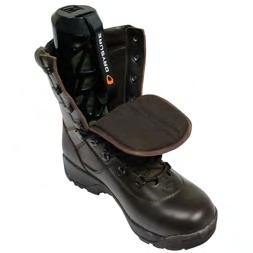
WEIGHT 1,200g COLOUR black/rifle green
SIZE one size fits all makes/sizes of military boots
With the right kind of attention, a pair of great boots can last for a long time – but neglect can be hard to undo. Using the Drysure Ultimate Boot Dryer is a nifty way to dry your boots (or other footwear) fast, if they get saturated during training.

The drying process is done without heat, electricity or batteries. This means you can dry your footwear anywhere, anytime, whether you’re at home or camp.
Drysure Ultimate Boot Dryers are 12 times quicker than normal air drying and reduce the bacteria
and fungal growth that can rot boot materials and cause odour. That's because the boot dryer comes filled with silica oxide beads, which can absorb up to ten days’ worth of moisture and sweat. This is packed in a high-gloss Voronoi outer shell for easy insertion and removal.
Each dryer lasts seven days and can be re-activated by air drying, placing over a radiator or in a warm oven.
With this useful and portable piece of kit you can leave behind that uncomfortable feeling of putting on funky or damp boots and always be dry and ready for the day ahead.

Supported content :
KIT REVIEW
kit review
Order yours here or scan the QR code 25 Instructions STEP 1 Insert into
STEP 2 Leave
STEP 3 Reactivate
by
footwear
for at least eight hours (or overnight)
dryers
placing on radiator or in oven
What the FINANCIAL EXPERT wishes you knew about gaming
Add-ons are big business

It’s easy to think that, once you've bought or downloaded a game, it’s free to play. However, free games often tempt you to spend money once you’ve started playing.
Often, these spending opportunities appear at exciting moments in the game which can make them hard to resist. Fifty pence might seem like small change, but trifling amounts add up.
It’s vital to set a game budget and stick to it. By keeping track of what you spend, you can stay in control. It’s far too easy to get carried away: research tells us that, on average, young people spend £250 per person, per year, on games.

Digital currencies are not pretend money
Many games have their own digital currencies (gold coins, diamonds or gems for instance) and it’s easy to forget that these are paid for using realworld money. It’s crucial to know the actual value (in pounds and pence) of what you're spending.
Gaming is a way to become budget savvy
Add-ons like levels, maps, weapons, tools and loot boxes are bought with real-world money.
26
Annette Whalley of HSBC reveals what she wishes we all knew about money when online gaming
on money
Knowing how to keep track of your spending in a game is a great way of learning how to budget. Analyse what you spend on a game over the course of a month – and then a year – and ask yourself: ‘Is it worth it? Could I save up for something I really want instead?'
Don’t let criminals in via the backdoor
Only download add-ons from trusted websites. An unofficial website might have an offer such as 100 gold coins for free, but once you’ve acquired them you could find you’ve also downloaded spyware or a virus. Trojan horse malware is designed to look like a legitimate programme, attachment or download but hides malicious code that can give backdoor access to your console and data.
Keeping shtum is smart
Identity theft and account fraud are an ugly reality in gaming. Keep safe by not revealing too much about yourself. You never know who you’re chatting to online – they may be phishing for information.
Only use audio and video with real-life friends and never share personal details with anyone online –including where you live, phone number, date of birth, school and other personal information. Fraudsters are good at filling in the gaps and before long they can have enough information to steal your social identity.
By putting your true age on your gaming account, you ensure gaming companies monitor and restrict the chat appropriately in the games you play.
Random passwords outwit scammers
It’s advisable to have a unique email address and password for your gaming account. Choose three random words for your password that won’t mean anything to anyone. Use a random username too. The problem with using something personal like Gemini14 is that you are potentially revealing your birthday is in June and that you are 14 years old.
To add an extra layer of safety, use a different password for your console to the one you use for your gaming account. Thumbprint or facial recognition are useful too.
People trying to give you money is dodgy
According to research, ten per cent of young people have been asked to send or receive money as part of a money deal (called money muling or money laundering). Never let anyone give you money during a game; passing on money puts you at risk of getting a criminal record. Block anyone who tries it and report them to the gaming company and Action Fraud.
It’s supposed to be fun
Keep a balance between the virtual and real worlds. If gaming gets in the way of real-life activities and spending time with your friends and family, set limits on how long you will spend online.
Watch your stress levels too. If you're getting frustrated and throwing money at a game because you can’t get to the next level, walk away or take a break. Gaming should be something that gives you joy, not robs you of having fun.
Go further
For more tips to help you stay in control of your spending and navigate online games safely, visit smart gaming here (or scan the QR code).
27
THE EXPERT
'Passing
puts you at risk of a criminal record'
HSBC
Meet the



RC Training Section team
SO1 Training
Lieutenant Colonel Catherine Skinner RA
Lt Col Catherine Skinner RA oversees cadets and adult training in Army Cadets - both ACF and CCF(A).
Catherine lives in Winchester with her husband and their teenage kids. The whole family love to sail and, before she started at Cadets Branch, they took a gap year and lived on a boat –

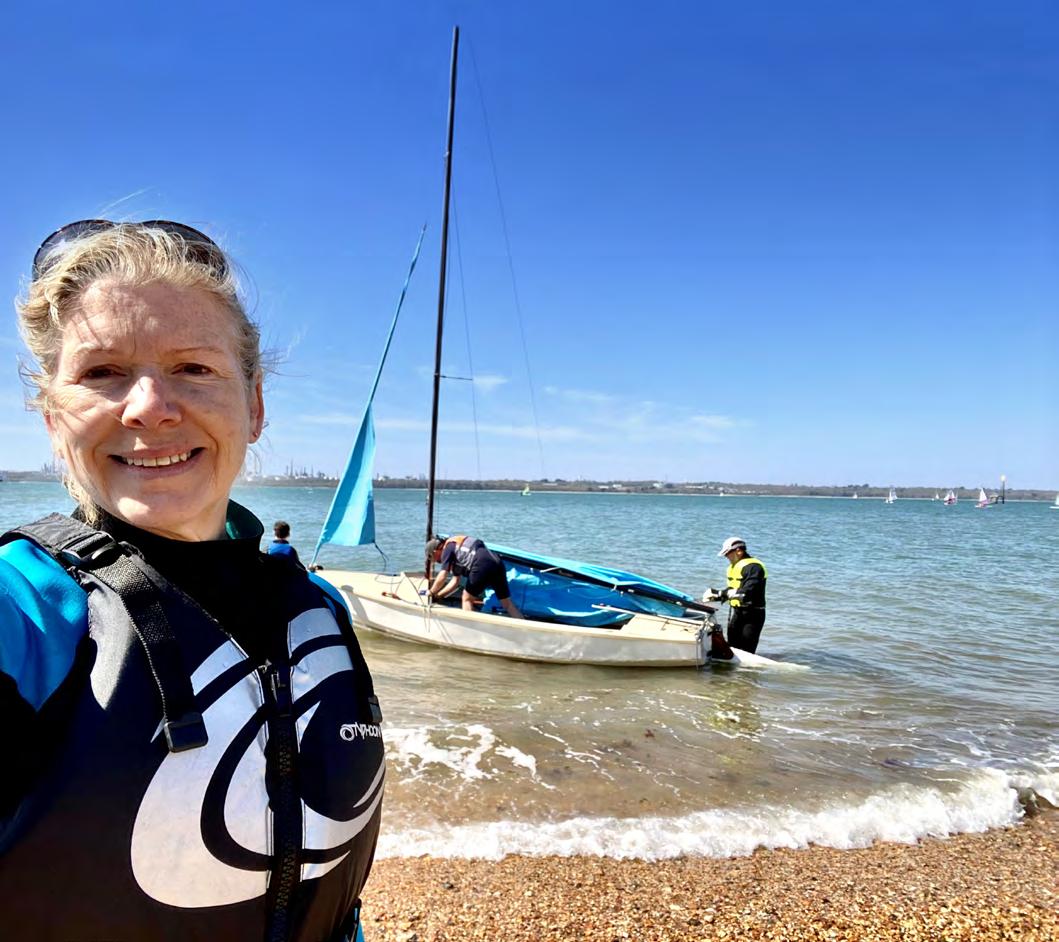
Catherine has a degree in chemistry and a masters in modern warfare. She is also a qualified professional photographer and plays netball. Catherine is a Scout leader, was vice-chair of the local pre-school and, over the last ten years, has co-founded, chaired and organised a charity ball in Winchester, raising over £100,000 for good causes.
SO2 Training Policy


Richard Smith
Richard is responsible for the design, coordination, development and implementation of strategic training policy across Army Cadets. He previously worked in education, delivering learning opportunities to young people in primary and secondary schools. He worked with at-risk and excluded youths, and at schools in deprived areas. He also provided outdoor-learning experiences.
In his spare time, Richard volunteers for the Scout Association as group Scout Leader. He also delivers canoeing and walking expeditions for the DofE Award. At any opportunity, he loves to get out in the fresh air.

If you like to put a face to the name, then meet the core team of Army Cadets Training Section at Regional Command. Find out what they do – and what makes them tick.
SO2 National Activities Sandra Hodgson MBE

Sandra delivers and organises national and international activities on behalf of HQ Army Cadets.

She represents Army Cadets to national and international stakeholders and is responsible for the planning, selection, budgeting and delivery of sponsored international exchanges. This includes Ex Oak and Maple Leaf (Canada), Ex Baltic Guard (Baltic States) and international exchanges with Poland and India.
Sandra also plans ceremonial events such as the Festival of Remembrance and Cenotaph Parade, as well as national ceremonies, state occasions and national STEM (science, technology, engineering and maths) activities.

A retired late entry officer, Sandra joined the Army as a private and served for 36 years, reaching the rank of lieutenant colonel. She was the first female to do this in the Royal Logistic Corps.
Sandra loves sport and, in particular, football. She played in and coached the Army and Combined Services Women’s Football Team for several years. Away from the field, she enjoys exploring with her 13-year-old son in their orange VW T6 Campervan.



SO2 Training Ops Major Simon Mann RA
Simon is responsible for the programming of cadet annual camps and assurance of all overseas training, as well as oversight of training safety assurance for cadet activity in the UK. He oversees all things shooting as well as training policy and procedure development.
In his spare time, Simon volunteers with Lincolnshire ACF, is an active shooter with a local club and supports adventurous training and DofE as a qualified DofE assessor, mountain leader and rock-climbing instructor. He also does paddle sports.
Simon is a qualified bushcraft instructor and enjoys getting out in the woods. He also loves to strike hot steel as an amateur blacksmith.

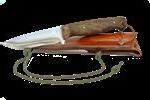
29
TRAINING
WO1 Training and Assurance WO1

Dan Broadhurst RLC


As Training and Assurance Warrant Officer for Army Cadets, Dan is responsible for all aspects of training safety and assurance.
He also oversees safety and assurance for all national activities and provides advice and guidance to the chain of command. He supports distributed training and monitors the effects of the delivery of training as well as the delivery and implementation of the ACSMS, accidents and incidents across the organisation, and the Cadet Activity List. He is also the Regional Command focal point for all training safety advisors.
In his spare time, Dan enjoys playing and watching most sports, especially golf, rugby and cricket, and is an avid reader of military history and Michael Connelly novels. He loves riding motorbikes and getting out and about in the Yorkshire countryside – and further afield – at any opportunity.

Gilly Moncur MBE

Gilly is responsible for planning, organising and acting as secretary to key meetings. She also provides a wide range of support to other members of the Training Section team, drawing on her previous experience with the Army Cadets Training Development Team and as Army Cadets Diversity and Inclusion (D&I) lead while head of the Step Change project.
In her spare time, Gilly is a CFAV and is currently the Army Cadets D&I Adviser for Scotland, where she is renowned for delivering D&I training with a bucket, balls and a furry chimp.


Gilly loves being outdoors and has climbed Mount Kilimanjaro and over 50 of Scotland’s munros. She is never happier than when in the hills, wearing boots and with a map in hand. She also delivers navigation training, including with the National Navigation Training Team.
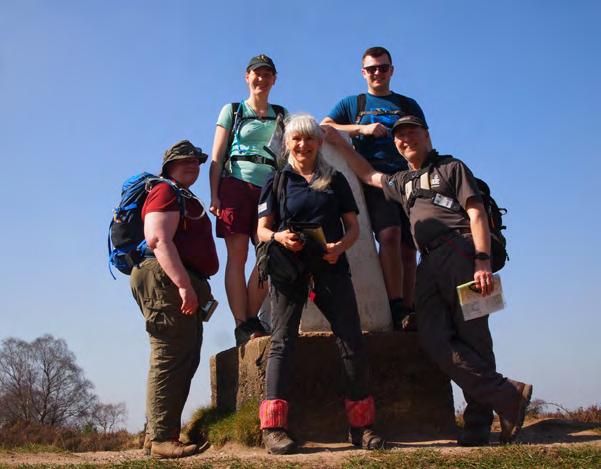

Meet the rest of the Training Section team in the next issue.



30
Training was at the heart of the Annual Army Cadet Conference 2022 which recently took place at St Omer Barracks in Aldershot. Themes included: getting the best from cadets; engaging with those who think differently to you; developing others’ talents; setting an example for

others to follow; bottom-up leadership; fostering an inclusive culture; and safeguarding.


Brigadier Neville Holmes gave the welcome address to the delegates who were comprised of regional colonel cadets, ACF commandants and national
leads, among others. Talks were delivered by Major General Eastman MBE (pictured), WO1 Paul Carney Army Sergeant Major, Dr Balissa Greene Assistant Head of Army Diversity, Colonel Catherine Jardine ACOS and SO1 Richard Morrison.


TRAINING Contact us for more info: 0121 772 5501 / customerservice@cadetkitshop.com Boots / PCS Uniform / Uniform & Accessories / Survival Kit / & much more HAVE YOU SEEN OUR NEW TRADE PORTAL? Sign up for a trade account at trade.cadetkitshop.com Bringing out the best in others
Photo: Kate Knight




BFBS ARMED FORCES DAY ESPORTS EXHIBITION TOURNAMENT Join us Saturday 25th June The Promenade Lounge – Scarborough Spa 1400 to 1600 Put your gaming skills to the ultimate test against the UK MILITARY ESPORTS teams –or come and watch the action live. Visit bfbs.com/esports for livestream details. BFBS is an o cial Armed Forces Day 2022 Media Sponsor

















 Brigadier
Brigadier



























 Photos: Matt Austin
Photos: Matt Austin


















 Crystal Drane, 19, from Burntwood in Staffordshire, credits Adventurous Training (AT) expeditions with giving her the confidence, determination and skills required to take on life's challenges.
Crystal Drane, 19, from Burntwood in Staffordshire, credits Adventurous Training (AT) expeditions with giving her the confidence, determination and skills required to take on life's challenges.



 GP Gemma Newman, author of The Plant Power Doctor, shares her prescription for a healthy and happy life.
Photo of Gemma: Dave Brown from Ape for Ebury, Penguin, Random House
GP Gemma Newman, author of The Plant Power Doctor, shares her prescription for a healthy and happy life.
Photo of Gemma: Dave Brown from Ape for Ebury, Penguin, Random House













































